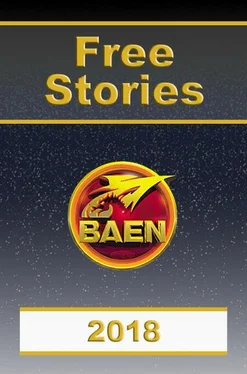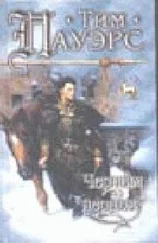The words were mild, calmly stated, unremarkable. And yet a sense of sudden dread and horror overtook Goond, for no reason at all. What was the matter? An attack of vertigo?
It was gone as soon as it had come. The lights, Goond decided, nothing more. There seemed to be a bit of a haze in the control room that made the familiar surroundings just a little strange in his eyes. He blinked, and things were clear and ordinary once again.
Time passed. Half an hour. Goond took over at the periscope, because he and Lachs had the most exposure to sailing ships between them. Navigator Rathke had their copy of Jane’s Fighting Ships out and ready for consultation, but it had little information on anything like the ship on scope; it seemed to have no smoke-stack at all. Completely unconverted. Remarkable.
The closer they got the less threatening the ship appeared, but also of less and less value as a military target. “It appears to be a merchant ship,” Goond said. “It isn’t any one of our cadet ships, nor does it seem to be British.” Could such a thing even carry war materials? Yet almost anything could be classified as war materials, that was true.
He felt an itch between his shoulder-blades, a little tension in his chest. There was no reason for alarm. They’d encountered British decoy ships—“Q” boats— before, but this one was nowhere near enticing enough a target to hope to lure a U-boat close enough to attack. Or was it? U-818 was approaching, wasn’t it? Goond shifted his feet irritably. He was only regretting the unfinished portion of his cigarette, he told himself. That was all.
Lachs took the periscope for another moment or five, and came to his decision. “Surface,” Lachs said, ducking his head to call through the hatchway toward the radio room. The radio closet . Where Bentzien was keeping his ear on the hydrophones for any chance British submarines, Goond supposed. “Bentzien, any traffic? Can you make contact?”
But Bentzien just shook his head. Why would there be radio contact ? Goond asked himself. A ship of its apparent vintage might not even have a radio. A tramp. A relic. Perhaps it had a belly-full of grain, or perhaps it was even more useless than that, perhaps it was in ballast. There would be no torpedoes loosed on this one. If sinking was to be done the deck gun would do it, but Lachs didn’t seem to be anticipating any such action, because the gun crew had not been called for, nor the ammunition train.
By the time the hatch was opened and Goond clambered up onto the bridge they were close enough to see the ship without any need for binoculars, which was closer than Goond had expected. He didn’t recognize the flag the ship was flying, a private flag of some sort, no nationality identified; there was a boat in the water making for them, but going by the short distance it had put between it and its mother-ship they had only just started rowing.
Sclarvie put the signaling flags away. Clearly a face-to-face was anticipated, clearly there was no immediate danger of destruction. Get away . There was a voice in Goond’s mind, his own voice, speaking urgently, with increasing panic. Go away get away get away . He didn’t understand it. So he ignored it.
“Alle hagel schip,” the man in the forefront of the row-boat called. A niggling unease was worming around just outside of reach in the back of Goond’s mind: the clothing the speaker wore seemed archaic, somehow, the bloused trousers, the outdated pattern of that plain cloth coat. “Trensferlettrs let?”
Goond didn’t understand. All hail ship , yes, that would mean heil Schiffe, hello boat. Transferlettrs, can you take letters. There was a square bundle perhaps twelve inches square in the bottom of the row-boat, wrapped in leather and tied up with thick twine.
“Wait, we will bring a man up,” Sclarvie called back, because what the man in the boat was saying didn’t translate into good solid German. It sounded a little Dutch, to Goond. To the man nearest the hatch Sclarvie said “Call for Heimsat, yes?”
Heimsat was one of the machiner’s mates. His people were from the borderlands with Denmark, if Goond remembered; maybe he would communicate more effectively. Goond didn’t understand the sense of panic he was feeling: as though he knew that something horrible was going to happen, as though it had already happened, as though he had to stop it from happening while at the same time there was nothing he could do to prevent the disaster that was almost upon them.
“We zullen wachten,” the man in the boat said. We will wait . Goond could hear the meaning as clearly as though he actually spoke the dialect. There were plenty of cognate words. It was not a far stretch. Here was Heimsat on the bridge, calling down to the rowboat that was now bobbing in the water just beside the saddle tanks; “Hallo!” Heimsat said. “U letters? Geef hem aan ons door, wij zullen ze nemen voor zu.”
It was clearly the right thing to say, because the man in the boat smiled—almost too eagerly, but why would that be?—and picked up the parcel. “Hier zijn ze, veel dank,” the man in the boat said. But Heimsat had squinted off into the distance at the other ship’s flag and gone pale, pointing.
“Not right,” Heimsat had said, urgency and disbelief alike in his voice. “Dutch East Indies? Ancient history, Herr ZweiVo, impossible, we should get away from here—”
And the alarm bells went off in Goond’s mind. Something was catastrophically wrong. They should not touch that parcel of purported letters, they should not, there was something badly amiss, why would any antiquated sailing boat be handing letters over to a U-boat, wrong, danger, warning—
“Herr EinsVo!” Someone was shaking him by the shoulder, and Goond realized he’d been dreaming. He was not off the coast of Africa, three years ago. He was here in the safety of his own berth on U-818. They were in Arctic waters. They had left Hammerfest in Norway. But fast on his glad realization of his near escape from whatever he had feared from the encounter in his dreams came the memory of where he was here and now, and why it was a much more immediate peril. “We are ready. Herr Kahloin raises the boat.”
On convoy duty from Hammerfest in Norway, hunting Allied supply missions to the Soviets by way of Murmansk. Surprised by bombers from an Allied aircraft carrier not five days out, because where was their air support? The same place it had always been. Functionally nonexistant.
Sent down into the basement with damage to the diesels, damage to the ballast tanks, to the fuel tanks, to every gauge and meter on the boat. The electrics on emergency reserve. All nonessential personnel confined to lying down in their hammocks or their bunks breathing through the damned potash cartridges that were supposed to protect them from the inevitable build-up of carbon dioxide in the air as the available oxygen inevitably, unavoidably, deteriorated.
Goond tore the respirator away from his face with a convulsive movement and struggled up out of his berth, his head as sore and tender as a burn wound or a boil. “How long?” he asked, but whether he meant how long they’d been down or how long it would take them to reach the surface rather escaped him at this moment. It didn’t matter. The man who’d awakened him—one of the sailors on the second watch, Dekert—was obviously as impaired as he was, and did not answer either of those questions.
“You are requested in control room. With respect.” Goond was glad of the helping hand. He’d been dreaming. He remembered now.
He’d felt no presentiments of dread or fear or panic at the time. It had been only at the point at which the rowboat had regained its parent ship, the point at which the packet of letters Sclarvie had accepted had disappeared, the point at which the ship had turned abruptly and hove away toward Table Bay at an angle and a speed that was impossible given current weather conditions, only at that point had Goond realized that there was no ship. There were no letters. There’d been no rowboat.
Читать дальше








![Тим Пауэрс - Последние дни. Том 2 [litres]](/books/393813/tim-pauers-poslednie-dni-tom-2-litres-thumb.webp)
![Тим Пауэрс - Последние дни. Том 1 [litres]](/books/394090/tim-pauers-poslednie-dni-tom-1-litres-thumb.webp)
![Тим Пауэрс - Последний выдох [litres]](/books/402145/tim-pauers-poslednij-vydoh-litres-thumb.webp)